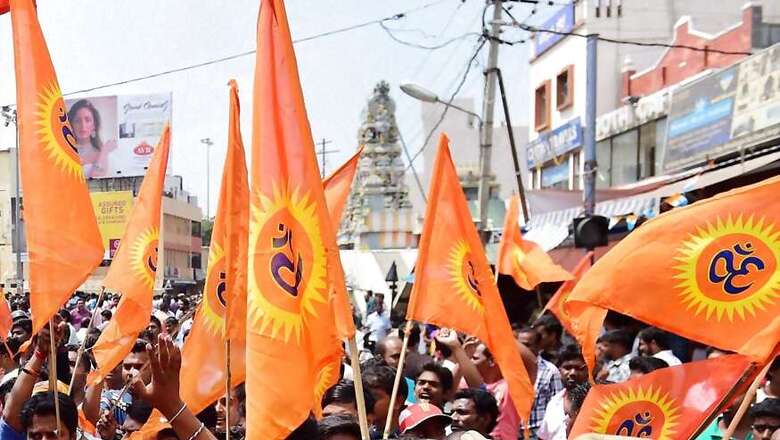
views
New Delhi: The Rashtriya Swayamsevak Sangh (RSS) has claimed to have extended its presence to 95% of India’s geography, more than the reach of the All India Radio which covers 92% of the country’s landmass.
As per a report released at the ongoing Akhil Bharatiya Pratinidhi Sabha at the Sangh’s headquarters in Nagpur, the RSS now has record 58,976 shakhas across India.
YoY growth of Shakhas, Saptahik ( weekly ) milan and SanghMandali 2017 vs 2018. pic.twitter.com/FygHS2u29S — RSS (@RSSorg) March 9, 2018
At the beginning of the three-day general body meeting, RSS joint general secretary Krishna Gopal said, “RSS activities are now being held in 95 percent geographical mass of India. We have presence across the country, except a few pockets in Nagaland, Mizoram and the Kashmir valley.”
That is three percent more than the geographical area covered by All India Radio's airwaves with a network of 262 radio stations accessible to almost the entire population of the country.
The number of shakas had fallen by over 10,000 since the fall of the Bharatiya Janata Party (BJP)-led government in 2004. However, by mid-2014, the number had increased to about 40,000 after the BJP returned to power at the Centre. The shakhas or branches carry out most of the organisational work of the RSS and hold public meetings for at least one hour.
RSS general secretary Bhaiyyaji Joshi, while presenting the Sangh’s annual report at its crucial triennial meeting, specifically mentioned the 'Hindu Sammelan' organised in Tripura by the organisation in September last year. The Hindu Sammelans organised in the northeastern states, especially in Tripura, was inspirational in many ways, he said.
A plan to contact each and every tribal group was prepared. The invitations were delivered personally. Each house was hoisted with a saffron flag and consequently one lakh households could be reached, the report said, adding that it was effective in every sense.
The work put in by the RSS was reaped by the BJP in the recently concluded assembly elections in the three northeastern states of Tripura, Meghalaya and Nagaland.
As BJP’s Biplab Deb took oath as Tripura chief minister on Friday, the RSS credited the mega Hindu congregation organised by it in the state last year as "inspirational" and "effective in every sense".
In Tripura, the Congress could not unseat the CPM for all the 25 years it remained in the opposition. The same set of people in the BJP managed a comprehensive victory. The BJP, in alliance with the IPFT, ousted the Manik Sarkar government and registered a remarkable win.
In Meghalaya, the BJP, with just two seats, outmanoeuvred the Congress, which had emerged as the single largest party, in cobbling up numbers to form the coalition government. Backed by the BJP and regional parties, National People's Party (NPP) chief Conrad Sangma was sworn in as the CM of Meghalaya.
In Christian-dominated Nagaland, the BJP managed to return a credible 12 seats, while the remaining four seats were shared between the National People’s Party (two seats), the JD(U) (one seat) and Independent (one seat). The BJP's support was thus crucial to government formation and Neiphiu Rio was again sworn in as the Chief Minister of Nagaland.
Despite an outright win in just Tripura, the BJP managed to form governments in all the three states. In Nagaland, the BJP's performance was all the more impressive as there were calls by the influential Nagaland Baptist Church Council to not allow any inroads by the party in the state. In the last election, the party could win only one seat.
The party's fortunes have seen a massive upswing with wins in state after state. Party president Amit Shah, post the results in three north-eastern states, said his party was now an established pan-India party.
In January, ahead of the assembly polls in north east, the RSS held Luitporiya Hindu Sammelan in Guwahati, Assam, in an attempt to bring the Sangh ideology closer to the people of the state.
Twenty Janjaati Rajas (Tribal Kings), heads of several tribes, including Khasi, Mising, Hajong and Tiwa, were invited for the event. It also included 2,000 prominent names from the political, cultural and intelligentsia circles. RSS chief Mohan Bhagwat delivered the main address.
With BJP's footprint visible all over the country, it seems Golwalkar's mission for RSS is coming to fruition: “to create all-round Anushasana in all walks of life and build together all our people into a unified harmonious national whole, extending from Himalayas to Kanyakumari”.




















Comments
0 comment